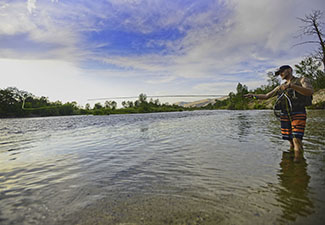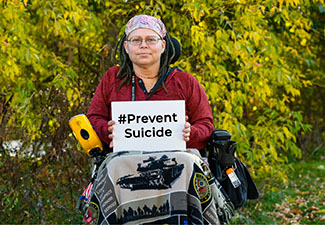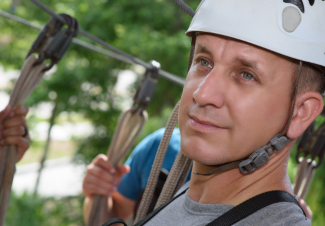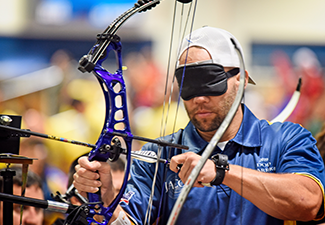Surviving Suicide and Creating Opportunity for Others

Zach Tidwell was just 16 years old when he first reached out to a Marine Corps recruiter. There was no question about it: He knew he wanted to be a Marine. But since he had to wait until after high school to enlist, the first thing he did when he qualified was excitedly sign up for the Marine Corp’s Delayed Enlistment Program (DEP), designed for prospective enlistees and those waiting for their enlistment date, to participate in early training to prepare for immediate enlistment upon high school graduation.
He officially enlisted immediately after high school and ultimately saw two deployments overseas. His service brought him from the jungle to the ocean to the snow, but he loved being a Marine.
“My dad was Air Force, my grandfather was Air Force, the other was Army, and it goes back past that,” said Zach. “But there’s a reason the Marine Corps is seen as a cut above … plus I wanted to be an infantryman.”
Zach’s life changed in 2017. He was still deployed, and began having challenges with his wife. He came home in November that year and they divorced in 2018. Just four months later, Zach was in a devastating motorcycle crash. The accident left him in the hospital with no memory of what happened and a traumatic brain injury (TBI). He was discharged from the military in 2018.
Enduring mood swings, TBI, a new divorce, and the stress of being in school to be an ER nurse, life seemed hard enough. However, other complications began to show in Zach’s life.
“I couldn’t fall asleep. If I did, I’d sleep for three hours and then be up for several more, maybe get another hour or so before I had to get up for work, or I couldn’t fall back asleep at all,” Zach said.
That’s when he turned to alcohol. While it wasn’t a healthy choice, Zach felt better when he hit the bottle.

Zach found adaptive sports to be one of the first stepping stones to regaining his full independence after fully losing his sight and hearing in one ear.
“Obviously, it wasn’t good, but it would knock me out. So, I started drinking. I started abusing alcohol,” he said. “I was hammered just about every night, probably to the point of blacking out just so I could sleep.”
This endless cycle of negative habits lasted about a year until Zach decided he no longer wanted to live. He made a plan. Four days later, he recorded a video for his family, got drunk, took out his firearm, and attempted suicide.
He woke up, miraculously, in the hospital, completely blind and deaf in one ear.
After months of rehabilitation and learning how to do everything from walking to swallowing again, Zach was on the road to being himself again.
Just eight and a half months after his suicide attempt, Zach was regaining his independence through snowboarding again. A month after that, in 2020, he was in the classroom working toward a degree in clinical psychology. He wanted to help people through his own personal experiences.
“I couldn’t be a nurse anymore. Nobody wants a blind guy running around with needles,” Zach said with a chuckle. “But I did try – I looked into it, but you really just can’t do it.”
I can be as independent as I want until you put an inaccessible website in front of me...
He reached a class in mid-2021, called “statistics for clinical research.” This class became the first that was unable to accommodate his disabilities. Rather than making the class accessible through technology or resources, the school offered Zach a student aid – a set of eyes, as he calls it. But that made every task take twice as long and complicated.
He took the first exam of the class soon after and immediately bought a bottle of whiskey. He spiraled and admitted himself to a VA hospital after becoming suicidal again.
“Since I regained my independence, that’s the hardest part to sort of accept, is that I can be as independent as I want until you put an inaccessible website in front of me...” said Zach. “Why can I get on my banking app but not do my homework on my own?”
He dropped out of college after treatment and made it his mission to learn how to write the computer code that made life more accessible to him, and others with disabilities.
In less than two years, Zach created an accessible app that was released in July of 2023 – a word game, called Zanagrams, that was fully accessible for those with disabilities like him, but looked and functioned like any other app for those without disabilities.
He calls it a “test run.”
“I’ve now put something into the world that’s helping other people, and I’m working to do something that’s bigger,” Zach said. “Now I’m working on something to just create opportunities for everyone – something that will give the same access to everybody.
I’ve now put something into the world that’s helping other people, and I’m working to do something that’s bigger...
This new app will again look and function normally for people without disabilities. The app will automatically magnify everything to preferred font sizes on their devices for those with low vision. Those who are color blind, would see shapes and contrast instead of colors to communicate changes on the screen. It’s also usable with your voice for other kinds of disabilities.
Zach is also writing a memoir to tell his personal story of choices, growth, and perseverance. He wants to dive into everything, not only where he is now, on the other side, but also the things that led to his suicide attempt and everything in between.
This includes the decisions he wishes he could change and the decisions he’s grateful for, like finding adaptive sports through Wounded Warrior Project® (WWP) and finding peers with similar experiences.
“I’ve done quite a few events here and there with Wounded Warrior Project, but the biggest impact always comes out of the people that you meet there and the conversations you have where you’re so humbled to be around people who have made the decision to stay here and continue after horrific things. It’s uplifting,” said Zach.
His mission now is to lead in those same footsteps.
“The hope is that, eventually, it will keep someone from doing what I did,” Zach said. “You can’t control if you’re depressed or not, but you can definitely take action toward trying to fix it in a healthy way, end the alcohol abuse … just take those steps.”
Contact: Kaitlyn McCue, Public Relations, kmccue@woundedwarriorproject.org, 904.870.1964
About Wounded Warrior Project
Since 2003, Wounded Warrior Project® (WWP) has been meeting the growing needs of warriors, their families, and caregivers — helping them achieve their highest ambition. Learn more about Wounded Warrior Project.



